It’s not an overstatement to say that customer service has become a critical battleground for companies aiming to stand out.
In fact, as consumer expectations continue to grow, it’s companies that use AI-generated customer support that emerge on top.
From personalized interactions to seamless problem resolution, these businesses are not only surviving in the current harsh market — they’re thriving.
Let’s explore the ways your business can also leverage AI to reach your full potential.
How AI is used in business
AI-generated customer support enables highly personalized experiences, with 62% of customers preferring[1] bots over waiting for a human agent. Moreover, 83% of companies[1] report that AI improves customer assistance quality, leading to increased satisfaction and revenue.
But how exactly are businesses incorporating AI into their customer support?
Here are some examples that seem to work best for companies using AI in customer service:
AI-powered agents for customer service
Fast, efficient, and always learning—that’s how modern AI chatbots can be described. AI agents for customer service save businesses money and time, allowing them to rest assured that each customer receives a timely and relevant response. How does it look in practice for companies using chatbots?
For instance, Tidio’s AI agent Lyro automates up to 70% of customer inquiries. It significantly reduces support expenses, cuts down average response times by 90%, and notably enhances customer experience and satisfaction levels.
Read more: Learn about the benefits and use cases of AI customer service agents. Also, check out the best AI agents for ecommerce with pros, cons, and pricing compared.
Automated helpdesk
An AI help desk is a tool that leverages automation to handle service requests. It answers inquiries via your website, email and popular messaging channels, gives customers self-service options for quick resolutions, and provides conversational support to common tasks and questions without the need for human intervention.
It can enhance your customer experience as well as make the work of your customer service team easier. In fact, as many as 91%[1] of support agents think a help desk system boosts their productivity by default.
With powerful automations in place, queries can be managed and resolved systematically, which leads to higher productivity and a better customer experience. And with AI-powered ticketing system features, you can automatically summarize and assign tickets to the most appropriate agent based on their expertise and workload.
Read more: Explore the top AI ticketing systems you can use for your support needs. Also, be sure to check out our full guide on AI agent assist tools and how to set them up in no time.
Live chat and chatbots combined
Leveraging chatbots doesn’t mean giving up on human support altogether. At the end of the day, no one gets humans better than other humans. AI agents are there to assist teams.
The recipe for success here is combining various chatbot types with the work of trained support agents on your live chat app. Like this, you can smooth out the interactions and gain valuable insights about your clients on autopilot.
When a visitor starts a chat, the AI gathers contact details and tries to resolve the issue on its own. It often succeeds, but if a request is too complex, it forwards the conversation to a human agent.
Unlike traditional phone support, where callers were often passed around, smart routing ensures visitors are transferred only once, saving time and costs. As a result, your customer support agents can focus on complex issues that require a human level of empathy and attention, while chatbots take care of the rest.
Read more: Learn how you can easily add Tidio to your website. Also, check out the top agentic AI companies you can use to automate your business processes.
You can use one of these advanced AI applications or combine a few for better results and well-rounded support. Take a look at these real-world use cases of companies using live AI customer support software to their advantage.
Companies Using AI Chatbots For Customer Service
Let’s take a look at some of the companies that successfully use AI customer support software to their advantage.
Tidio
Being an all-in-one customer experience platform, Tidio cannot overlook the importance of speed and personalization in customer support. The company’s mission is to help small and medium-sized businesses deliver seamless service, build trust, and grow revenue. To do this, Tidio has turned to its own AI-powered assistant, Lyro.

Key objectives:
Tidio’s support team faced a familiar challenge. Balancing high-quality service with fast response times while handling a large volume of queries became difficult. Traditional rule-based chatbots often felt robotic and lacked the human touch, leaving customers frustrated.
The team’s goal was to automate repetitive questions without sacrificing personalization. At the same time, Tidio also wanted to give agents more time to focus on complex, high-value interactions.
Results:
- 58% of support queries automated with Lyro
- 75% decrease in first response time, dropping from 1 minute to less than 15 seconds
- 79–87% success rate in handling conversations
- More natural conversations that feel human-like
The previous generation of chatbots required a method of communication that is unnatural to humans. Lyro allows us to use the power of LLM.

Read more: Check out Tidio AI transformation to find more results and information on how the company uses AI on a daily basis. Also, read a full case study on how Tidio support team implemented AI automations.
eye-oo
Being a multi-brand eyewear ecommerce platform, eye-oo cannot overlook quality customer service. The company offers models from popular fashion brands as well as designer eyewear, including handmade limited edition pieces. It’s crucial for the brand to ensure exceptional quality craftsmanship, due care, and accuracy in everything they do.
That’s where AI helps. The company is using a complete customer experience solution provided by Tidio, which lets them collect leads, increase sales, and build trust with customers.
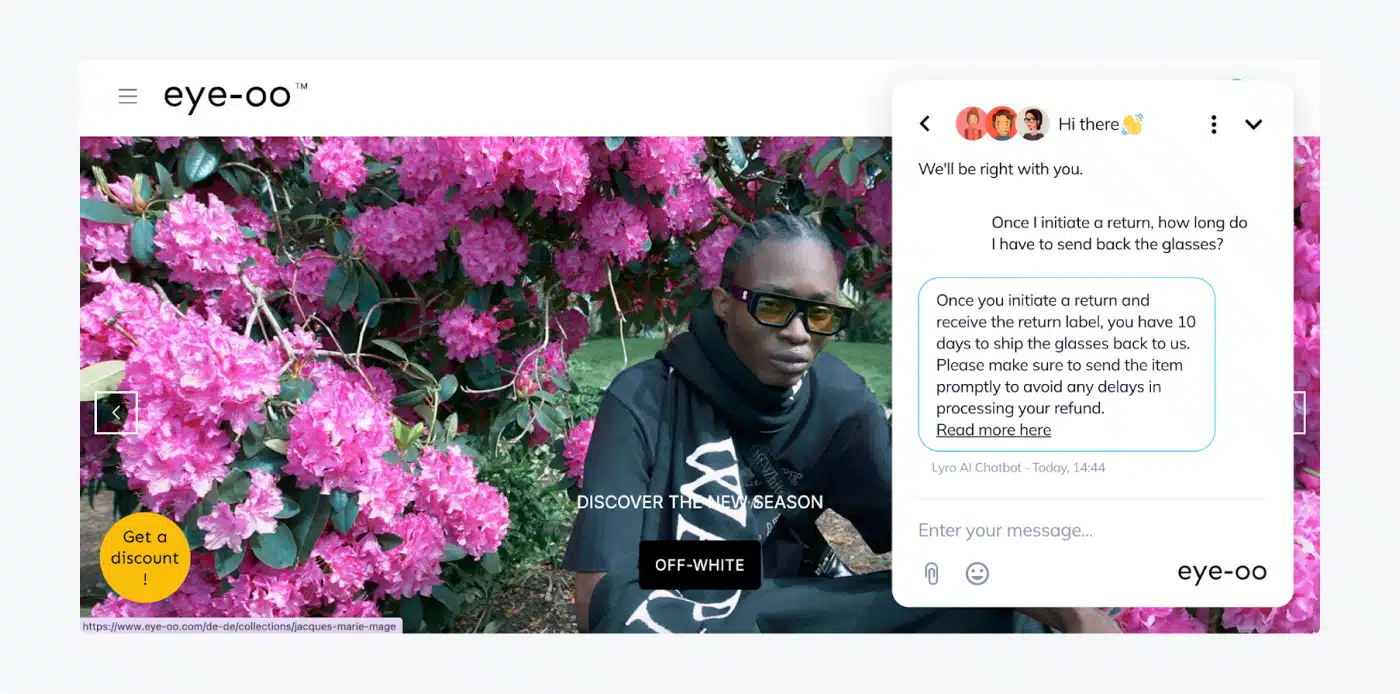
Key objectives:
The company wanted to speed up their average response time and reduce the number of time-consuming FAQs for support agents. The brand’s strategy was to implement automation without losing personalization and offer a unique customer experience.
Currently, eye-oo makes use of plenty of powerful AI features in Tidio. For instance, they implemented a shopping cart recovery tool, which engages customers when they abandon their order.
They also use our Lyro AI agent as the first line of support on their website. Trained on eye-oo’s business and website data, Lyro recommends products, helps customers look up the status of their order, and answers questions about shipping, return policies, prescriptions, and more.
Results:
- eye-oo achieved a 25% increase in sales and 5x boost in conversions
- Tidio and AI-attributed revenue amounted to €177K
- The company achieved a whopping 86% decrease in waiting times, slashing the waiting time from 5 minutes to 30 seconds
- Out of 2,233 total support conversations, Lyro AI handled 1,825 successfully while acquiring 1,305 leads at the same time
Since changing to Tidio and implementing the cart abandonment chatbot, we were able to increase the number of conversions. From the 537 conversations the bot managed, it assisted in 1.6k EUR total sales in 2023 alone.

Read more: Check out the full eye-oo case-study to learn more about eye-oo and their use of conversational AI for customer service.
Zalando
Zalando, a leading fashion and lifestyle retailer in Europe, launched a generative-AI fashion assistant powered by ChatGPT. Customer service chatbots have proven themselves to be exceptionally useful when it comes to retail. Realizing this, Zalando made a step towards enhancing the experience of discovering and shopping for fashion online.
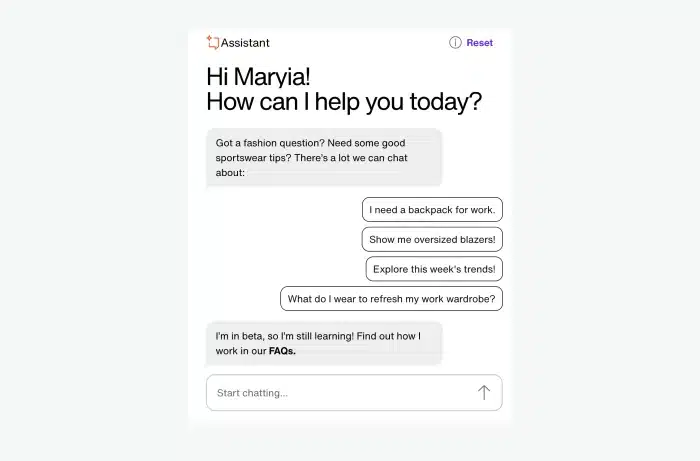
Key objectives:
Zalando looked for a solution that would allow customers to ask questions in their own words and receive accurate answers, fast and round-the-clock. The idea was to help website visitors navigate through Zalando’s extensive assortment in an intuitive way.
How does Zalando’s virtual shopping assistant cater to customers’ tastes? The chatbot understands specific customer preferences and eagerly suggests items they might enjoy. For instance, if a customer asks, “What’s a good outfit for a wedding ceremony in Santorini in August?” Zalando’s bot recognizes that the event is formal, takes into account the typical August weather in Santorini, and offers a few personalized outfit ideas.
Results:
- Zalando Assistant is now available in 25 markets in their local languages
- The chatbot brought Zalando a 23% increase in product clicks
- Products added to wishlist grew by 40%
- Zalando was able to scale its traffic 12x by deploying their Assistant to more markets
As a leader in fashion ecommerce in Europe for 15 years, we have consistently embraced new technologies to enhance our customers' shopping experience. We are excited to be experimenting with ChatGPT to help our valued customers discover even more fashion they will love.

Read more: Explore more benefits of shopping bots and how to use them.
ServiceNow
ServiceNow is a leading enterprise software that offers a cloud-based platform to help digitize and unify organizations. The company has incorporated generative AI into all of its workflow offerings. This includes the Virtual Assistant app, enabling business users to independently access support for ServiceNow products and applications.
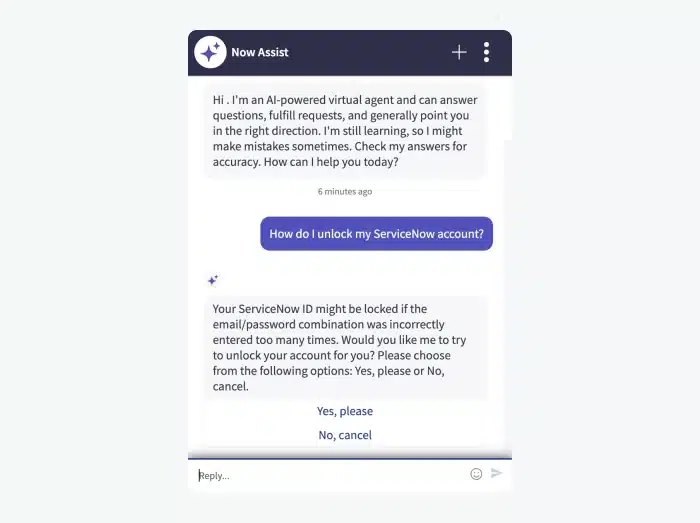
Key objectives:
ServiceNow aimed to deliver a thoughtful and trustworthy experience balancing innovation and human touch. They were looking to allow customers to harness intelligence at scale and maximize their ROI.
The company uses various LLMs (Large Language Models) to augment its functionality, including Now LLM and Azure OpenAI. Their primary use case is to quickly provide answers that are relevant, conversational, and clear, making it even easier for ServiceNow users to independently solve their issues.
Results:
- ServiceNow partnered with NVIDIA to develop custom LLMs for work automation
- Through their partnership with Hugging Face, the company has announced an open-access open-science StarCoder LLM for code generation
By embedding generative AI into our platforms, we are empowering our customers to radically improve productivity and realize the true potential of enterprise‑grade AI.

Read more: Here are the key differences between AI and traditional help desk tools. Also, this is all you should know about generative AI agents.
Bella Santé
Bella Santé is a business offering luxury med spa services. Since its establishment in 1996, it has become the most awarded day spa in the Greater Boston area.
As more people started using their beauty service, it became clear that they needed a more efficient customer support system. The company wanted to switch from a classic call center to an automated tool that would assist customers in real time. So, the brand decided to add Tidio to their support ecosystem on top of their existing contact center to modernize their customer service.
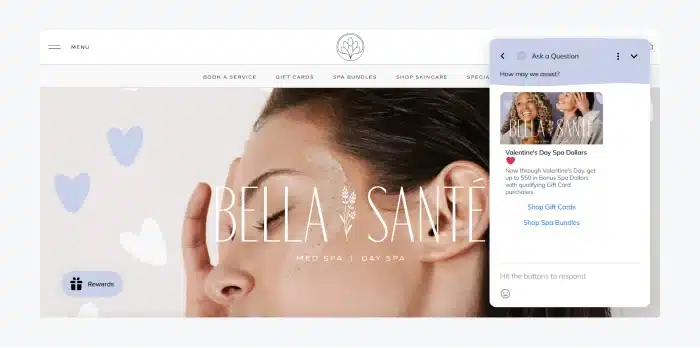
Key objectives:
It’s true that many people nowadays are reluctant to interact with call centers and prefer to find information themselves on the website. So, Bella Santé looked to automate its customer service using a combination of live chat and Lyro AI Agent. This would allow customers to easily get answers to common questions directly from Bella Santé’s knowledge base.
Bella Santé also wanted to boost leads and customer loyalty, as well as increase sales while personalizing the customer experience—and it all worked out.
Results:
- With the help of AI, Bella Santé managed to reach $66,000 in sales
- Lyro helped the company automate a whopping 75% of customer conversations
- Six months after adding Tidio, the company gathered 450+ new leads using the pre-chat survey
- Lyro helped personalize their online customer experience to ensure satisfaction with each conversation. It also notifies and forwards chats to human agents when a client is struggling to make a decision or needs extra help
I love the data and I love the self-learning kind of aspect of Lyro. We've been able to pull hundreds of questions from our FAQ and continue to have Lyro learn from that information.

Read more: Discover our Bella Santé case-study to explore in detail the impact AI has made on their business. Also, here’s a complete AI customer service readiness checklist you should check out.
Marriott International
Marriott International, a global hospitality giant, operates thousands of hotels across multiple brands. With an increasing demand for instant, round-the-clock customer service, the company looked for a solution that could enhance guest interactions while reducing response times. This led to the introduction of ChatBotlr, an AI-powered virtual assistant.
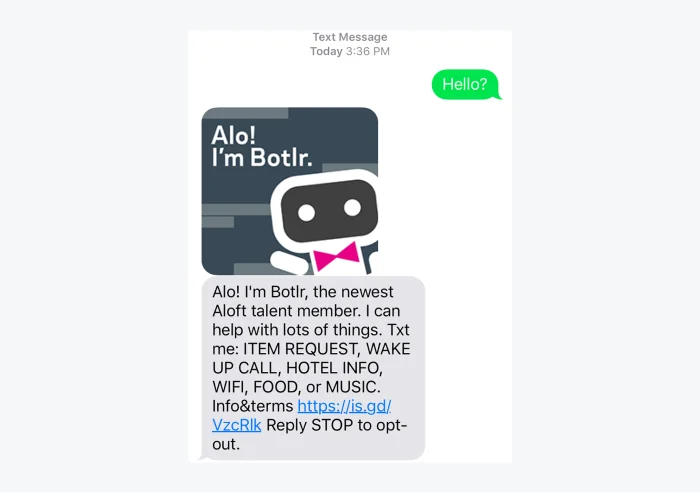
Key objectives:
Marriott wanted to create a more engaging guest experience by providing instant, automated customer service through ChatBotlr. The goal was to ensure guests could easily request services, get answers to common inquiries, and receive personalized recommendations without needing to call the front desk.
Another key objective was to reduce the workload for hotel staff, allowing them to focus on complex guest needs rather than routine questions. ChatBotlr was designed to offer a smooth, mobile-friendly experience, making it easy for guests to interact with the hotel through text-based communication at any time.
Results:
- ChatBotlr successfully streamlined guest requests, reducing wait times and improving service efficiency
- The chatbot played a crucial role in boosting customer satisfaction, allowing guests to request services with ease via text or mobile apps
- Guests appreciated the convenience of a digital concierge, leading to higher engagement and positive feedback
By embracing emerging messaging technologies, we can expand service to our guests on their terms and through communication channels they increasingly prefer and feel comfortable using.

AirHelp
AirHelp is a globally recognized service for assisting airline passengers with canceled, overbooked, or delayed flights. It has helped more than 16 million passengers get compensation from airlines.
With a constant flow of messages, AirHelp has to use multiple communication channels, replying in real-time at scale. Without automation, it’s practically impossible to gather and prioritize so many tickets at the same time. So, AirHelp makes use of AI-generated customer support (and does so really well).
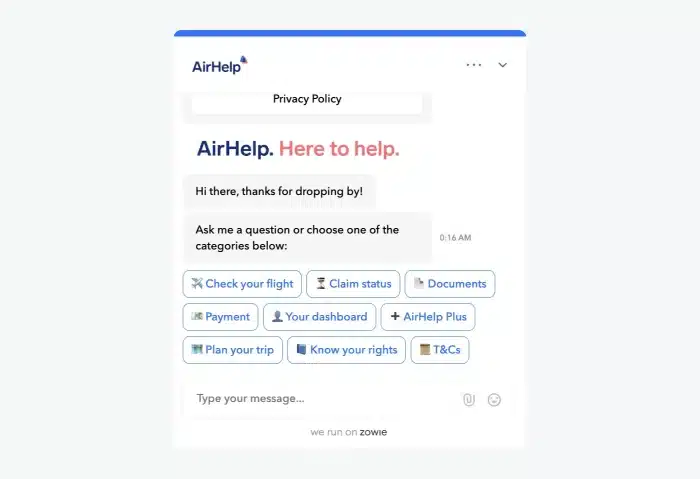
Key objectives:
AirHelp needed a solution that would collect requests, assign them to agents, and prioritize tickets based on urgency. Chatbots take the responsibility of being the first point of contact for thousands of customers, while the human agents take care of more complex requests.
Given the nature of the service, most customers contacting AirHelp are pretty stressed from experiencing problems with their flight. Understandably, they expect an immediate response and assistance.
Results:
- The AirHelp chatbot managed to improve the average response time by up to 65%
- The AI technology monitors AirHelp’s social media channels in 16 languages, alerting the customer support team of any potential risk-prone terms and conversations
- AI customer service handles complex queries in real-time, assigns them to support agents, and never leaves anxious customers waiting
It’s revolutionized how our agents work, making it easier to assist more customers in less time—even as our ticket volume continues to climb.

Scale faster with AI customer service
ADT Security Service
American District Telegraph (ADT) Security Service is part of Johnson Controls, a leading global technology multi-industry group. Now, ADT Security Services is the global leader in security services, keeping assets, businesses, and belongings safe.
Clients trust the company with their most important assets, so quality customer service is crucial to build trust and show users that the business is there for them.

Key objectives:
ADT Security Services aimed to speed up response times, improve user experience, customer satisfaction and engagement, and increase retention. The company tried several AI solutions before, but weren’t satisfied.
The brand looked for a solution with a proven ROI, dedicated support, and easy installation process as well as robust functionality. And that’s how they chose Tidio—specifically the Tidio+ plan—that allows them to enjoy simplified chat workflows, lower costs per chat, and personalized support, among other benefits.
Results:
- ADT gained more control over their workflow and achieved a whopping 30% increase in customer satisfaction
- The business improved their number of handled conversations by 45% while lowering the quantity of missed conversations by 74%
- ADT Security Services increased conversions from 44% to 61%
- The company’s average response time decreased by almost 22%, dropping from 4 minutes 34 seconds to an average of 3 minutes 34 seconds
In terms of flexibility, with Tidio, I have more specialized attention from the specialist chat, more control over the workflow, and more control over the client support filters.

Endeksa
Endeksa is a predictive real estate data analytics and insights platform that operates in Turkey, Spain, and Portugal. With a user base of over 300,000 and over 5 million successful “e-Valuations,” Endeksa analyzes properties based on variables, such as location and structural features. This software utilizes machine learning, big data analysis, and AI to predict how long it will take to sell a house and at what price.
To thrive in the competitive and highly digitalized real estate market, using AI tools for customer service is a must. That’s why Endeksa decided to implement customer service automation.

Key objectives:
Endeksa was overwhelmed by endless incoming phone calls. They needed an all-in-one platform to manage communication with their growing customer base.
The company looked for a good value proposition—something affordable but with a broad and flexible functionality. Their end goal was to boost lead generation while saving time with the help of customer service automation.
Results:
- Endeksa slashed waiting times by an impressive 59% by using an automated ticketing system with smart routing and prioritization
- The company achieved a whopping 138% increase in leads
- Endeksa’s chatbot reached a helpfulness rate of up to 88%, with an overall increase in customer satisfaction of over 10%
We needed the most sustainable and efficient way to manage the traffic and improve customer satisfaction. So we implemented Tidio chatbot technology.

Read more: Learn more about Endeksa and its use of AI-generated customer support in our dedicated case study. Also, explore the topic of AI in customer communication and learn about its use cases and best practices.
ING
ING, the renowned Dutch bank, has been on the forefront of AI customer service usage in the finance industry since 2017. The banking industry requires a lot of precision when it comes to customer communication, so speedy responses and quality assistance have always been a priority. Luckily, those are made possible by AI, which is proven by ING’s consistent use of chatbots.
The bank has different chatbots for different markets, like the Australian Lionel, the Belgian Marie, the Dutch Inge and the wholesale banking chatbot Bill. And they all use Natural Language Processing (NLP) to understand the customers’ needs better.
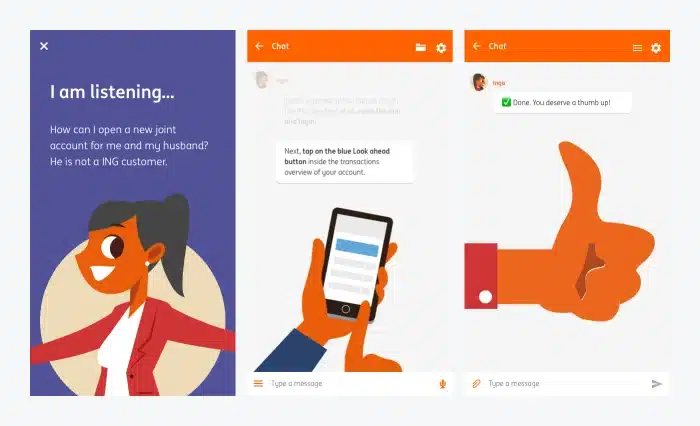
Key objectives:
ING launched their chatbots on Meta Messenger, which was a strategic move to let customers access them quickly and easily without logging into their bank account.
The bank needed AI that could offer speed, scalability, data-driven knowledge and human-like qualities, like empathy. Meta helped them achieve it all.
Results:
- By using Meta’s Messenger, ING managed to significantly increase their accessibility and reach, which led to more conversations handled and better customer satisfaction
- The chatbot gave customers self-service options, like checking their balance, making a deposit, or getting quick answers
- AI enabled 24/7 support so customers can contact the bank on weekends and holidays
- ING was also the first bank to implement voice technology in its processes, allowing customers to use their voice to log in and access certain functionalities
A cheaper-to-operate but expected level of customer service leads to high customer satisfaction, which leads to loyalty and ultimately higher revenues.

Read more: Interested in finance chatbots for your business? Check out our guide to get started.
Suitor
Suitor is an Australian suit and tuxedo rental company. Starting in the founder’s garage, it grew to a global multi-million dollar business offering exceptional quality suits and easy accessibility for customers.
With a global business comes a lot of popularity and, consequently, a lot of customers in need of assistance. That’s why Suitor started searching for an AI customer service solution and decided to go with Tidio’s conversational AI, Lyro.
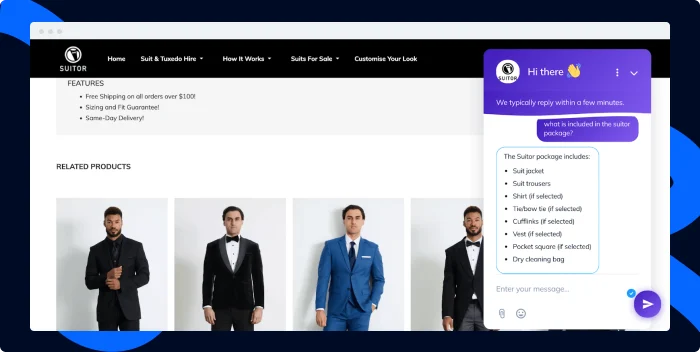
Key objectives:
Suitor struggled with a growing number of customer issues and requests. And even with a dedicated FAQ section on their website, the founders spent hours replying to common questions. That’s when they realized it was time to implement smart software that would answer those questions in real time without a human agent.
The business required the tool to have a simple interface, flexibility, and to be able to train it easily. Lyro checked all those boxes.
Results:
- Suitor managed to automate a whopping 85% of its customer service, which means that most of the queries are now taken care of by their retail chatbot
- The average response time decreased from 3 minutes to just 15 seconds for live chat and a whopping 6 seconds for their AI chatbot
- On average, only 24% of queries are transferred to support agents
I’m so much happier because we can trust that the customer service is being taken care of by the chatbot.

Read more: Discover the whole journey of Suitor with Tidio in our case study.
Procosmet
Procosmet is an Italian company specializing in haircare and beauty treatment products for all needs. The company was born out of the idea to take hair treatment to the next level in beauty salons, both in Italy and worldwide. Procosmet puts sustainability, ethics, and well-being as their priority. They work to refine their customer experience with every client interaction.
This goal cannot come true without excellent customer service. That’s why Procosmet decided to implement live chat with automated chatbots.
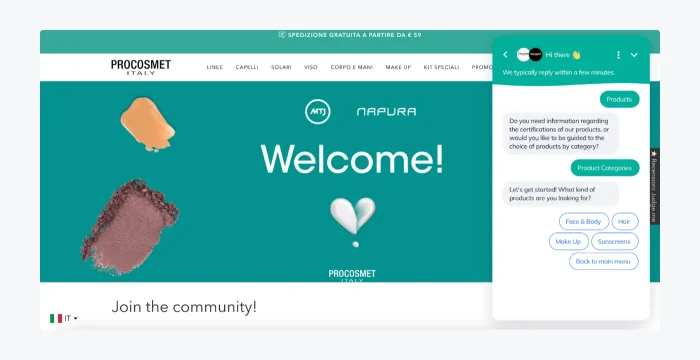
Key objectives:
Procosmet was growing fast, and it was becoming hard to manage orders—canceling, modifying, and issuing refunds took too much time. The company needed an AI boost to their customer service operations in order to increase customer satisfaction, reduce waiting times, and help with closing more sales.
That’s why they implemented Tidio+ on their website—and the results speak for themselves.
Results:
- Procosmet saw an increase in sales by a whopping 23%
- The number of leads increased to over 100 prospects monthly
- They achieved an average open rate of 18-22% with their newsletter chatbot and Tidio’s email marketing services, plus an ROI of over 1000 EUR from a single campaign
- With Tidio, Procosmet also increased their rating from 3.8 to 4.7/5⭐️ based on 704 customer feedback scores
Our goal has always been to develop a healthy community and thanks to Tidio, we are getting closer, enriching our databases with healthy and interested new contacts, every day.

Read more: Learn more about Procosmet’s journey with Tidio in our case study. Also, discover top examples of ecommerce brands that increased sales with AI chatbots.
The top company for AI-generated customer support
The success stories of the companies mentioned in this article show the transformative power of ecommerce AI tools. By leveraging AI-driven solutions, these businesses have not only enhanced customer experiences but grown their revenues and improved customer retention and loyalty.
Tidio prides itself in its power to streamline operations, personalize interactions, and extract actionable insights from data. AI-generated customer support is not just a buzzword for us: it’s how we’ve changed the game for multiple businesses.
Top benefits you can expect from using Tidio:
- Automate up to 70% of support requests with Lyro AI Agent
- Filter and manage tickets automatically
- Respond to customer emails in seconds with Lyro AI for email
- Sell more with automated product recommendations
- Offer truly omnichannel, multilingual support
Also, every Tidio+ customer is guaranteed a 50% resolution rate within the first weeks. Lyro AI becomes a true long-term partner for your business.
Your company can get the best of AI-generated customer support. Why not give it a chance today?
Learning from companies that use AI in customer service
In conclusion, the success stories of the ten companies showcased in this article underscore the transformative power of AI in customer service. By leveraging AI-driven solutions, these businesses have not only enhanced customer experiences but grown their revenues and improved customer retention as well as loyalty.
These experiences serve as evidence of AI’s ability to streamline operations, personalize interactions, and extract actionable insights from data. As businesses navigate the evolving landscape of customer service, using AI technologies becomes a strategic move for staying competitive and thriving in the digital age.
Your company is no exception. Why not give AI a chance today?
Use the power of AI to grow your business
Using AI for customer service: FAQs
AI-powered customer support refers to the use of artificial intelligence technologies, such as chatbots, natural language processing (NLP), and machine learning, to automate and enhance customer communication. These systems can handle various customer inquiries, provide instant responses, and learn from past interactions to improve accuracy over time.
According to statistics, more than 73% of companies use or plan to use AI-powered customer service, and this number is growing. The growing interest is explained by the ever-improving technology and the efficiency and productivity that AI brings to businesses.
AI can benefit customer support operations in several ways. It can automate routine tasks, such as answering FAQs and processing simple transactions, reducing the workload on human agents. The technology also allows businesses to provide 24/7 support, improve response times, and deliver personalized assistance based on individual customer’s preferences or behavior.
While AI can automate many aspects of customer support, it’s unlikely to entirely replace human agents. AI excels at handling repetitive tasks and providing quick responses, but human agents bring empathy, creativity, and problem-solving skills that only people possess. The most effective approach is often a combination of AI and human support.
Businesses can ensure the accuracy and effectiveness of AI-powered support systems through continuous monitoring, testing, and refinement. They can collect feedback from customers and human agents to identify areas for improvement and finetune AI algorithms accordingly.
It’s important to choose AI systems that prioritize data security and compliance with data privacy regulations, such as GDPR and CCPA. For example, Lyro by Tidio utilizes Claude, renowned as the most secure large language model available. This way, Lyro ensures safety and ethical usage. It operates solely based on the knowledge extracted from your website and the details you furnish, continually refining its performance with each interaction.
Imagine having all your customer conversations including live chat, AI bots, and support tickets, happening in one easy-to-manage place. That’s what Tidio does. It helps businesses reply to customers instantly, automate repetitive questions, and keep support running like clockwork.
Absolutely. Tidio is powered by artificial intelligence to make customer communication smarter and faster. Its AI agent, Lyro, understands natural language and responds just like a real person, without your team having to jump in every time
Yes! Tidio comes with both rule-based bots you can customize and Lyro, the AI chatbot that learns from your content to answer questions automatically. You can use ready-made templates, build your own conversation flows, or simply let Lyro handle FAQs.

